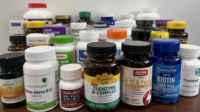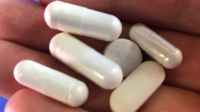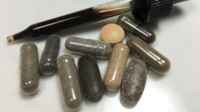
Answer:
There is evidence that certain supplements, such as magnesium, CoQ10, riboflavin (B2), inulin (a prebiotic), and melatonin (alone or along with PEA) may help to reduce the frequency or severity of migraine headaches. 5-HTP or fish oil (from supplements or the diet) may also reduce migraine frequency, although evidence supporting use of these supplements is mixed. Certain diets have been associated with reduced frequency and severity of migraine attacks.
Potential triggers of migraine include certain vitamin deficiencies, concentrated beetroot supplements (which can be high in nitrate, and therefore may potentially affect dilation of blood vessels), as well as foods such as chocolate or watermelon, and even use of topical estrogen cream.
(Note: Although L-arginine is involved in the production of nitric oxide in the body, there do not appear to be any reports of L-arginine supplementation causing migraine in people – although high doses have been reported to cause headache (not reported as a migraine.)
Supplements that may help with migraine
There is evidence that magnesium, CoQ10 and riboflavin (B2) may help to reduce the frequency or severity of migraine headaches. The amino acid 5-HTP or fish oil (from supplements or the diet) may reduce frequency, although the evidence is mixed.
Melatonin may reduce the frequency of migraine (with or without aura), with effects similar to that of the antidepressant amitriptyline. Melatonin may also help reduce episodes of primary stabbing headache (PSH). Low dose melatonin taken in combination with palmitoylethanolamide (PEA) also seems to slightly reduce the frequency, duration and severity of migraine attacks.
Some herbal supplements, such as butterbur and feverfew may also be helpful (Grossman, Altern Med Rev 2001; Saranitzky, J Diet Suppl 2009). However, be aware that taking St. John's wort with migraine medications or the painkiller tramadol can cause adverse effects.
One clinical study found that a DAO (diamine oxidase) supplement reduced the duration of migraine attacks by 30%, but did not reduce pain or frequency.
The prebiotic inulin was shown in one, small study to reduce the frequency, duration and severity of migraine headaches in women.
Low blood levels of vitamin D have been associated with a moderate increase in migraine frequency (although not migraine severity), as well as with a higher risk of frequent headaches in general. However, some research suggests this may occur because migraine may limit lifestyle factors, such as exercise and sun exposure, that help to maintain or boost vitamin D levels, and it’s not clear if supplementation helps.
Although ginger has been studied for reducing migraine frequency and pain, it has not been proven effective.
Diets that may help with migraine
A study in Turkey among 80 men and women with episodic migraine found that following the Mediterranean diet (which is high in fresh fruit and vegetables, olive oil, and fish) or the Dietary Approaches to Stop Hypertension (DASH) diet (which is low in sodium, red meat and added sugars, and high in fruits, vegetables, whole grains and low-fat dairy) was associated with fewer migraine attacks, and migraines of less severity and shorter duration compared to a poor-quality diet (fewer fruits and vegetables, more red meat, etc.). For example, over a 3-month period, participants with good adherence to the Mediterranean diet had an average about four severe migraines, compared to an average of six and eight migraines among those with moderate or poor adherence, respectively. Similarly, those with good adherence to the DASH diet had an average of two severe migraine attacks during this period, compared to four and seven severe attacks among those with moderate or poor adherence, respectively. The results were similar for people with migraine with or without aura (Bakirhan, Nutr Neurosci 2021).
Foods that may trigger migraine
Consumption of cocoa and/or chocolate might trigger migraines in some people. Cocoa and chocolate contain the amino acids tyramine and phenylethylamine, which could potentially trigger migraines, as well as histamine, which could cause headache, although the evidence from clinical trials is mixed.
Interestingly, in a study among 3,935 people in Brazil with migraine, non-processed plant-based foods (legumes, cereals, vegetables and fruits) were reported to trigger a migraine episode in 40.3% of participants. Fruits were the most commonly reported trigger, occurring in 38.9% of participants, compared to vegetables (0.81%), cereals (0.28%) and legumes (0.23%). Among fruits, watermelon was, by far, the most common trigger (29.5%), followed by passion fruit (3.73%), orange (2.01%), pineapple (1.52%), grape (0.51%), banana (0.46%), acerola (0.25%) and papaya (0.25%). The researchers theorized that watermelon might trigger migraine because it contains citrulline. The body converts citrulline to arginine -- a precursor to nitric oxide, which is a potent vasodilator. Migraine onset typically occurred about one hour after consumption, although some people reported onset within ten minutes of consuming the triggering food. None of these foods were reported to trigger headaches among a second group of participants who suffered from tension headaches (Silva-Neto, Postgrad Med 2021).
Other triggers
Use of prescription topical estrogen products, such as estradiol creams and gels, may trigger migraine in some people; it’s generally recommended to stop use if this occurs and consult with a healthcare provider (ESTRACE Vaginal Cream USP 0.01% Prescribing Information; Divigel (estradiol gel) 0.1%, Prescribing Information), although rapid discontinuation may also trigger migraine (Sacco, J Headache Pain 2018).
Join today to unlock all member benefits including full access to all CL Answers and over 1,400 reviews.
Join NowAlready a member? Sign In Here.
Join now at www.consumerlab.com/join/














Submit your comment
This feature is restricted to active members.
Join now to add comments and get all member benefits, including over 1,400 reviews.
Join NowAlready a member? Sign in here.